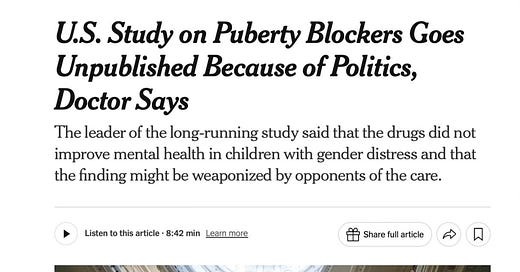Pediatric Gender Medicine Doctor Johanna Olson-Kennedy Is In The News. I Watched the Video of Her Advocating for Mastectomies For Gender Dysphoric Minors
The controversial pediatric gender medicine doctor has been pilloried over revelations that she withheld null research findings about puberty blockers and has a very dissatisfied former patient.
Dr. Johanna Olson-Kennedy, a major leader in pediatric gender medicine at Children’s Hospital of Los Angeles, is making controversial waves this week.
The New York Times just reported that Dr. Olson-Kennedy has withheld NIH-funded research findings that indicate puberty blockers were not tied to mental-health improvements in gender dysphoric children. She told the Times that she has deliberately refrained from publishing these null findings out of concern of how they would be leveraged politically.
In her interactions with Times reporter Azeen Ghorayshi, Dr. Olson-Kennedy downplayed the substantial mental health problems many of the children exhibited upon entry into the study. Instead, she claimed, contrary to evidence, they were doing well before puberty blockers—and that they continued to do well while taking them.
Keep reading with a 7-day free trial
Subscribe to Hazard Ratio: Benjamin Ryan to keep reading this post and get 7 days of free access to the full post archives.




